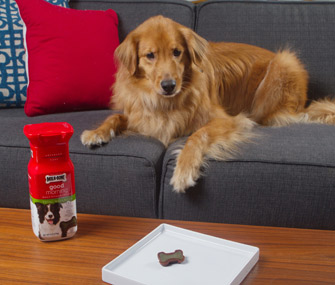[ad_1]

Russ Powell for vetstreet.com
We all wish our
dogs could live forever. Luckily, there are some easy things you can do to give your beloved pup the best chance at a long and healthy life.
We’re sharing the best ways to help protect your dog’s well-being, from exercising his body and brain to providing the right nutrients for good health.
1. Watch His Diet
Being overweight can lead to lots of other health problems in dogs. Feeding your dog the right diet is vital to controlling his weight. Before you make any changes, consult with your veterinarian to choose the best food for your pet, taking into consideration his size, weight, age, activity level and overall health. Your vet may recommend something like Milk-Bone
® Good Morning
® Daily Vitamin Treats, which contain a specially formulated blend of nutrients not typically found in most dog foods. These beneficial nutrients can help promote your dog’s well-being by supporting his immune system, brain, heart and digestion. Of course, you’ll want to make sure you’re not overfeeding him treats. Treats should not exceed 10 percent of your dog’s daily caloric intake.
Some veterinarians also suggest a
food or supplement formulated for older dogs — many of these contain higher levels of antioxidants and glucosamine to help fight inflammation and maintain joint function in dogs with
arthritis.
You should feed your dog at regular mealtimes rather than having food available to him all the time and make sure family members aren’t sneaking him
too many treats or table scraps. Those calories add up quickly.
2. Use Food Puzzles
Stimulating your dog’s brain is another way to help keep him young. One way to do this is by feeding him meals in various
food puzzles that can be rotated on a regular basis to prevent boredom — and thus help keep him out of trouble.
Food puzzles can engage your dog’s hunting instinct, encourage physical activity and work his brain. These puzzles, which come in many shapes and sizes, also help prevent dogs from
eating too fast.
You can keep things super simple by hiding bits of kibble in the house or yard; stuffing a rubber Kong toy with treats that the dog has to work to get to; or upping the ante with trickier interactive toys that require dogs to move blocks, spin discs or work through multiple layers to get their reward,
writes Dr. Marty Becker. He says his own pets regularly eat their meals out of food puzzles.
Even though today’s pets are “born retired,” Dr. Becker writes, by enticing him with yummy treats, your dog will likely
surprise you with how quickly he can figure out the puzzle.
3. Give Him Regular Exercise

iStockphoto
Exercise, nutrition, training and mental stimulation can all help your dog live a longer, healthier life.
Much like humans, dogs also need regular exercise to help
maintain a healthy weight. Exercising releases healthy endorphins and reduces stress hormones like cortisol, writes Dr. Becker. Getting a chance to explore beyond the familiar also stimulates your dog’s mind. And then there’s the more obvious effect:
staying fit!
Assuming you and your veterinarian agree that your dog is up to it, you can continue with his
regular walks, trips to the dog park and playing fetch well into his senior years. Many elderly pooches still enjoy a slow stroll, a ride in a wagon or hydrotherapy for those with achy joints.
Even when the weather is bad, there are plenty of ways to keep your
dog active indoors, like playing fetch with a soft toy or a making time for a little tug of war.
4. Teach Him New Tricks
In addition to his body, your dog’s brain needs regular exercise to stay healthy, Dr. Becker writes — and training doesn’t stop when your dog leaves puppyhood. Even dogs who are already well-behaved can learn and
practice new tricks to challenge their minds.
Challenging him with a scent game is another fun option. You can train him to search your home for a hidden treat, or flip over two containers and teach her to sniff out which one is hiding a treat. These are just a few of many
games trainer Mikkel Becker recommends to help keep your dog young and active.
For aging dogs, it may be beneficial to train them to do things that might keep them safer or
make life easier for them, like wearing nonslip booties around the house or learning to
walk up a ramp. Your vet may also recommend a vitamin treat like Milk-Bone
® Good Morning
® Daily Vitamin Treats – Healthy Aging with beneficial antioxidants and omega-3 fatty acids to support brain health.
5. Get Him Preventive Care
Taking your
dog in for
regular checkups with his veterinarian might help catch health problems earlier, which could then improve his prognosis. As your dog ages, he’ll likely need to be seen by the vet more often. Most vets recommend an exam
twice a year for seniors, even if they appear healthy.
Regular, at-home preventive care includes things like
keeping his teeth clean. You should brush your dog’s teeth daily and have them professionally cleaned regularly by his veterinarian. This may help prevent dental diseases that can cause pain and serious complications when left untreated. Lastly, you’ll want to help
prevent parasites like fleas and ticks by consistently giving him preventative medication, all year round.
By staying on top of all of these things, hopefully you’ll be able to enjoy your dog’s company for as long as possible — and he’ll be more likely to stay
young at heart.

